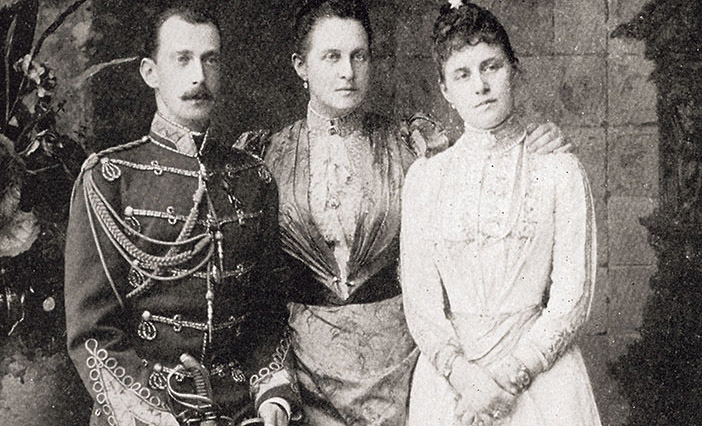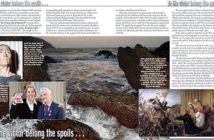Marie Pavlovna, Grand Duchess of Russia, belonged to the last generation of the Romanov dynasty to reach maturity before the bloody overthrow of tsarism in 1917. In the recollections of her childhood and youth she shed much light on the twilight years of Russia’s royal era and also brings an insider’s view of the turbulent final years before the “ancien régime” was swept away by war and revolution. Escaping the Bolsheviks, literally by a few hours, she survived to confront more challenges as an émigré in Europe and America. In the first in a three part biography Royalty Magazine Editor Marco Houston recalls the life of a grand duchess who grew up acutely aware that her noble class was living on a “volcano that was ready to belch fire and swallow us up at any instant.”
Grand Duchess Marie’s life story encompasses ages so vastly different that the world of her youth would later seem to her in exile “so remote, so unlike the world of swirling traffic and shining towers that I see from my windows as to seem medieval by comparison.” It was not only the flight into exile and the burgeoning modernity of Western Europe and America which elicited that reaction, but also a long internal struggle between her restricted royal upbringing and the need for personal growth and purpose in her life.

(Above) Grand Duke Paul of Russia and Princess Alexandra of Greece, with Alexandra’s mother Queen Olga of Greece. (Top) Grand Duchess Marie with her brother, Grand Duke Dimitri, in their aunt Ella’s sitting room in 1904.
Marie was born in 1890 to Grand Duke Paul, sixth son of Tsar Alexander II, and Princess Alexandra of Greece, daughter of King George and Queen Olga. They married in 1889 when Paul was twenty-nine and Olga was just eighteen. It was a happy but tragically brief union. In 1892 Alexandra died after giving birth to a second child, a son baptised Dimitri. She and Paul had been visiting Grand Duke Sergei at his residence of Ilinskoye when Alexandra suddenly fell ill. It was so quick and unexpected that there was no doctor to hand and the village midwife was the only help to be had. By the time the doctor arrived Alexandra had fallen into a coma. She lay comatose for six days, then gave birth before passing away. She was only twenty-one and seven months pregnant.
The frail newborn was almost overlooked. Marie recalled: “My brother came into the world so small, so feeble, that no one thought he could live. His arrival went almost unnoticed amid the grief and disorder . . . My old English nurse has told of me having found the newborn child bundled haphazardly among some blankets on a chair, as she came running to get news of my mother. It was only after my mother was dead that they began to pay attention to Dimitri.” Alexandra’s death not only devastated the family but would also have great consequences for their father and for the upbringing of both Marie and Dimitri. In the immediate aftermath the family pulled together to ensure Dimitri’s survival. As baby incubators were still a rarity he was wrapped in cotton wool and kept in a cradle heated by hot water bottles, while Uncle Sergei personally gave Dimitri the bouillon baths the doctors had recommended. After a few months spent recuperating at Ilinskoye the family returned to St. Petersburg.
In St. Petersburg, Paul and his children lived in a palace on the banks of the River Neva. Gradually Dimitri grew in strength and family life returned to normality. Marie and Dimitri were looked after by their nurses and attendants in a suite of rooms on the second floor of the palace. Isolated from the rest of the household, the ‘nursery suite’ became a world unto itself ruled over by the children’s nurse, Nannie Fry, and her assistant Lizzie Grove. They brought with them the methods and mindset of English childcare and enjoyed absolute control of their royal charges and the retinue of chambermaids, valets and assistants. Marie and Dimitri’s early years were, in fact, more English than Russian as not only their carers but also the immediate family spoke English to them. Marie was six before she began to learn her native language.
Grand Duke Paul would visit the children twice a day. Whilst he loved his children he, like so many royal parents, refrained from showing them spontaneous affection and would only embrace Marie and Dimitri when saying goodnight. Marie adored him nonetheless: “Every moment that I could be with him was joyous and, if for any reason a day passed without our seeing him, it was a real disappointment.” Grand Duke Paul was commander of the Imperial Horse Guards and for little Marie he was a dashing and romantic figure: “My father was tall and thin with wide shoulders. His head was small; his rounded forehead a little pinched at the temples. For so large a man his feet were remarkably small and his hands were of a beauty and delicacy . . . He was uniquely charming. Every word, movement, gesture bore the imprint of distinction. No one could approach him without feeling drawn to him . . .”
He was also a joker and a prankster. One Easter he slipped a hen’s egg under the children’s pet hare and succeeded in convincing them that it had laid the egg! Despite these periodic joys, on the whole Marie considered her childhood something of an ordeal, one which afflicted her personal development. She certainly found it to be a lonely and isolated upbringing . . . (Extract from Royalty Magazine Vol. 18/07)



